Official Openly Brags About Iran’s Disinformation Network On Twitter
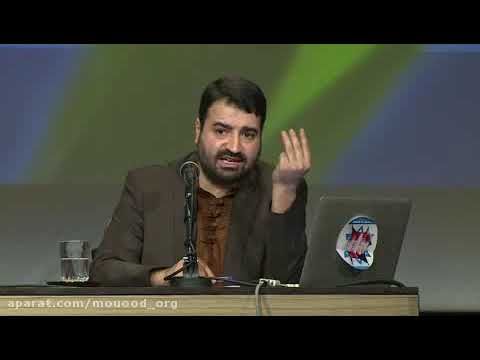
An Iranian official who is an advisor to the parliament for plan to restrict the internet has openly talked about Iran’s network of fake accounts and disinformation campaigns.

An Iranian official who is an advisor to the parliament for plan to restrict the internet has openly talked about Iran’s network of fake accounts and disinformation campaigns.
In a recent interview, Ruhollah Mo’men-Nasab -- a former head of Culture Ministry’s Digital Media Center and the current secretary of cyberspace activities of the Popular Front of Islamic Revolution Forces political party – talked about their tactics to disrupt the flow of information and tarnish the image of activists.
He is an outspoken opponent of social media platforms and free internet access, describing them as espionage tools, and has been a consultant and staunch supporter of the bill pushed by hardliners to limit internet in Iran, entitled 'Legislation to Protect Cyberspace Users'.
In a video of his remarks that surfaced last week, Mo’men-Nasab seems quite pleased with the result of their misinformation campaigns, elaborating that they made numerous counterfeit twitter accounts with photos and names of influential rights and political activists “who were against the revolution and interests” of the regime.
Describing the disinformation network as part of a psychological warfare, Mo’men-Nasab said they have made software for the tweets and retweets and had created at least 256 accounts to make the process faster and more effective.
Twitter and Facebook have been suspending or shutting down hundreds of Iranian fake accounts over recent years, suspected of spreading disinformation, even in during elections in the United States.
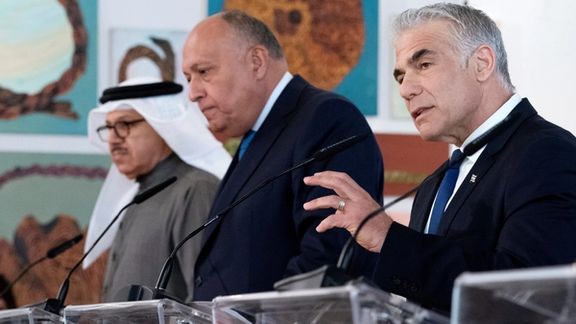
Iran’s foreign ministry has harshly condemned the historic Negev Summit between foreign ministers of four Arab states, Israel and the US Secretary of State.
Calling the gathering "an evil meeting in the occupied territories," spokesman Saeed Khatibzadeh said the summit of foreign ministers of Israel, Egypt, the United Arab Emirates, Bahrain, and Morocco, also attended by the US Secretary of State Antony Blinken, was a "betrayal of the cause of Palestine".
The participants in the summit met on Monday to display their unity against Iran. The Arab states also used the rare event to press Israel to return to the long-stalled peace talks with the Palestinians.
Tel Aviv says the event would be repeated and expanded. "This new architecture - the shared capabilities we are building - intimidates and deters our common enemies, first and foremost Iran and its proxies," Israeli Foreign Minister Yair Lapid said Monday alongside his US, Emirati, Bahraini, Moroccan, and Egyptian counterparts.
"As neighbors and, in the case of the United States, as friends, we will also work together to confront common security challenges and threats, including those from Iran and its proxies," Lapid, who initiated the summit said.
"Any move to normalize and establish relations with the terrorist Zionists and the occupiers of al-Quds (Jerusalem) is a stab in the back of the oppressed Palestinian nation and a gift to the child-killing Israeli regime to continue the killing of the [Palestinian] people and occupation of their land," Khatibzadeh said.
According to the Jerusalem Post, Blinken clarified behind closed doors that the US has not made a final decision regarding the removal of the Iranian Revolutionary Guards (IRGC) from its Foreign Terrorist Organization (FTO) list, which all the five other countries strongly opposed.

History has proven that the "process of compromise and submission" has brought its advocates "nothing but defeat and humiliation," Khatibzadeh said while reiterating that Iran is prepared to cooperate with regional countries and expand its relations with them "to counteract the Zionist and American plots that aim to sow discord and spread instability in the West Asia region."
Tehran’s harsh words came as it has been negotiating for almost a year with Western powers to revie the 2015 nuclear agreement, JCPOA. The last main hurdle is Iran’s demand to remove the IRGC from the US terrorism list.
The UAE, Bahrain and Morocco normalized ties with Israel under a 2020 US initiative known as the Abraham Accords.
On Monday, in an unattributed commentary entitled "Some Truths About the Historical Meeting of Delusional [Leaders] At Negev Desert", Nour News website tried hard to downplay the importance of the meeting and claimed the summit only revealed that Israel is not able to create a coalition against Iran and the "resistance [front]".
The ‘resistance front’ is a term coined by Tehran to describe its allies and proxies throughout the region.
"Iran's recent attack on the Mossad base in Erbil and intensification of the missile and drone attacks of [the Houthis of] Yemen on strategic locations in Saudi Arabia and the United Arab Emirates in recent days revealed that no plot can stop the resistance front in fulfilling security and stability in the region and counteracting the mercenaries of the West," Nour News which is affiliated to the secretary of Iran's Supreme National Security Council (SNSC), Ali Shamkhani, wrote.
"All this shows the fact that the Resistance [Front] led by the Islamic Iran is now the main player in the region," the commentary said.
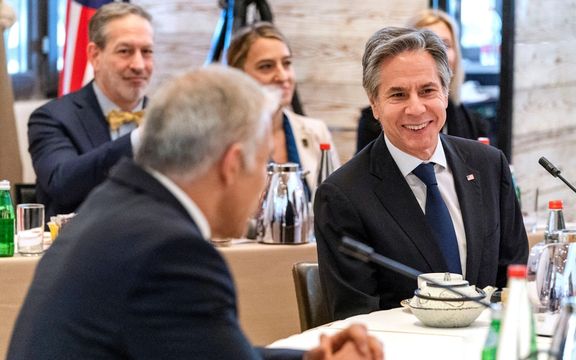
The United States, Israel and four Sunni Arab countries concluded two days of talks on Monday, vowing to expand and make the ‘Negev Summit’ a “permanent forum.”
Wrapping-up the landmark gathering Monday at Sde Boker, Negev, those taking part said the forum would build commercial and security ties with other Sunni Arab states. Unlike Bahrain, Morocco and the UAE, Saudi Arabia has held back from ‘normalization’ with Israel, which Arab League policy conditions on Israel recognizing Palestinian statehood.
“We are today opening a door before all the peoples of the region, including the Palestinians, and offering them to replace the way of terror and destruction with a shared future of progress and success," Israeli foreign minister Yair Lapid said.
"This new architecture -- the shared capabilities we are building -- intimidates and deters our common enemies, first and foremost Iran and its proxies," Lapid added alongside his counterparts from the United States, United Arab Emirates, Bahrain, Morocco and Egypt.
The summit participants decided to make it into a “permanent forum”, Lapid said, adding that its doors were open to “all the peoples of the region, including the Palestinians".
Expressing US commitment to reviving the 2015 Iran nuclear deal, which Israel and some Gulf Arab states oppose, Secretary of State Antony Blinken said the US would work with “friends…to confront common security challenges and threats, including those from Iran and its proxies.”
"As neighbors and, in the case of the United States, as friends, we will also work together to confront common security challenges and threats, including those from Iran and its proxies”, Blinken said.
The UAE, Bahrain and Morocco normalized ties with Israel under the 2020 US-mediated Abraham Accords. In 1979, Egypt became the first Arab state to make peace with Israel.
Bahrain Foreign Minister Abdullatif Al Zayani described the discussions as helpful to fend off Iranian-backed groups like Hezbollah. "Of course, part of this process will be renewed efforts to resolve the Palestinian-Israeli conflict," he added.
As the four Arab states’ foreign ministers gathered in Israel to discuss the Iranian threat with the United States, Arab gunmen killed two Israeli policemen Sunday night.
Iran’s Fars news agency, which is affiliated to Iran’s elite Islamic Revolutionary Guard Corps (IRGC),splashed a headline on its website saying Hezbollah congratulated the “martyrdom” operation.
Morocco's Foreign Minister Nasser Bourita said on Monday that his attendance at the meeting in Sde Boker was the "best response to such attacks”.
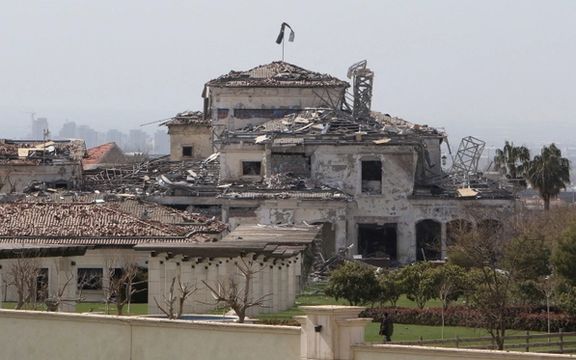
The purpose of an Iranian missile strike on Erbil in Iraq this month might have been meant to derail a gas pipeline project, an exclusive Reuters Report says.
A plan for Iraq's Kurdistan region to supply gas to Turkey and Europe - with Israeli help - is part of what angered Iran into striking the Kurdish capital Erbil, Iraqi and Turkish officials say.
The March 13 attack on Erbil came as a shock to officials throughout the region for its ferocity and was a rare publicly declared assault by Iran's Islamic Revolutionary Guards Corps (IRGC).
Many were surprised that the attack took place amid nuclear talks with Iran and at a time when Tehran has been demanding that the United States lift sanctions imposed on the IRGC.
The IRGC said the strike hit Israeli "strategic centers" in Erbil and was retaliation for an Israeli air raid that killed two of its members in Syria. There were also hints that the attack was in retaliation for an Israeli drone attack in February that destroyed an IRGC drone base in Western Iran.
The choice of target, however, baffled many officials and analysts. Most of the 12 missiles hit near the villa of a Kurdish businessman involved in the autonomous Kurdistan region's energy sector.
Iraqi and Turkish officials who spoke to Reuters on condition of anonymity this week said they believe the attack was meant as a multi-pronged message to US allies in the region - but that a key trigger was a plan to pump Kurdish gas into Turkey and Europe, with Israel's involvement.
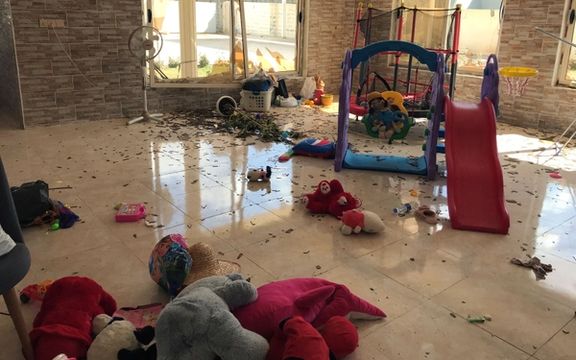
"There had been two recent meetings between Israeli and US energy officials and specialists at the villa to discuss shipping Kurdistan gas to Turkey via a new pipeline," an Iraqi security official said.
A senior Iranian security official told Reuters the attack was a "multi-purposed message to many people and groups. It's up to them how to interpret it. Whatever (Israel) is planning, from energy sector to agriculture, will not materialize."
Two Turkish officials confirmed that talks involving US and Israeli officials recently took place to discuss Iraq supplying Turkey and Europe with natural gas but did not say where they took place.
The Iraqi security official and a former US official with knowledge of the plans said the Kurdish businessman whose villa was hit by the Iranian missiles, Baz Karim Barzanji, was working to develop the gas export pipeline.
The disclosure puts Iran's attack on Erbil in the context of regional energy interests, rather than Israeli military attacks on the IRGC, as widely reported.
Israel's foreign ministry said it was not familiar with the matter. Barzanji did not immediately respond to a Reuters request seeking comment.
The office of Iraqi Kurdish President Nechirvan Barzani denied any meetings with US and Israeli officials to discuss a pipeline took place at Barzanji's villa. The Kurds deny there is any Israeli military or official presence in their territory.
TURKEY-ISRAEL RAPPROCHEMENT
The Iraqi, Turkish and Western sources spoke to Reuters mostly on condition of anonymity because they are not allowed to give statements to the media.
They said the move comes as a politically sensitive time for Iran and the region: the gas export plan could threaten Iran's place as a major supplier of gas to Iraq and Turkey while its economy is still reeling from international sanctions.
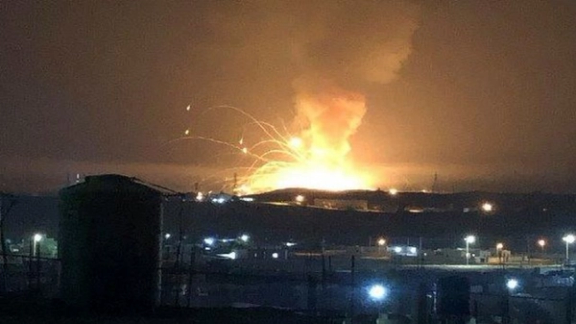
It also comes as Israel, Iran's biggest enemy in the region, and Turkey are strengthening ties and looking at further energy cooperation as sanctions on Russia over its invasion of Ukraine threaten severe shortages across Europe.
Iran is also a close ally of Russia and the disruption of a plan to supply gas to Europe could also harm Moscow’s prominent role as a major supplier to the continent.
Turkish President Tayyip Erdogan said last month that Turkey and Israel can work together to carry Israeli natural gas to Europe. Erdogan also met Barzani and said that Ankara wants to sign a natural gas supply deal with Iraq.
"The timing of the attack in Erbil is very interesting. It seems it was more directed at northern Iraq's energy exports and possible cooperation that would include Israel," one of the Turkish officials said.
"Some talks were held for northern Iraq natural gas exports, and we know that Iraq, the United States and Israel were involved in this process. Turkey supports this too," the official added.
The Iraqi security official said at least two meetings to discuss the issue, with US and Israeli energy specialists, had taken place at Barzanji's villa, which he said explained the choice of target for Iran's missile strike. No one was seriously hurt in the attack, but the villa was severely damaged.
An Iraqi government official and a Western diplomat in Iraq said that Barzanji was known to host foreign officials and businessmen at his home and that they included Israelis.
The Iraqi security official and the former US official said Barzanji's KAR Group company is working to expedite the gas export pipeline. The new pipeline would eventually connect to one that has already been completed on the Turkish side of the border, the former US official said.
KAR Group built and manages the Kurdish region's domestic pipeline, the Kurdistan presidency's chief of staff Fawzi Harir said. It also owns a third of Kurdistan's oil export pipeline under a lease agreement. The rest is owned by Russia's Rosneft.
Based on report by Reuters

Israel is to appoint a military attaché to the United States Fifth Fleet headquarters in Bahrain, Eitan Naeh, the Israeli ambassador to Manama said Monday.
"This will happen soon," Naeh told Israel's Army Radio, although a date was not set. "It is in the midst of various bureaucratic processes. I reckon that, by the summer, we will have a fuller staff, along with other officials who will join the embassy."
The ambassador’s remarks came on the second day of the ‘Negev Summit’ in the Israeli settlement of Sde Boker, involving Egyptian Foreign Minister Sameh Shoukri, Bahraini Foreign Minister Abdullatif Al Zayani, United Arab Emirates Foreign Minister Abdullah bin Zayed, Moroccan Foreign Minister Nasser Bourita, and US Secretary of State Antony Blinken.
The Jerusalem Post newspaper cited “sources close” to Israeli Foreign Minister Yair Lapid that Israel and the Arab states with which it has ‘normalization’ agreements – the UAE and Bahrain – brokered by the Trump administration were discussing a military alliance aimed at Iran. Saudi Arabia has stuck to the Arab League position of refusing normalization until Israel concedes Palestinian statehood.
“Already in the first conversations, and on the background of security challenges in Europe, ideas were brought up to advance a regional security architecture that will build deterrence against threats from the air and sea,” the source said, according to the Post. Israel and Arab Gulf states have opposed 11-month negotiations in Vienna aimed at reviving the 2015 Iran nuclear program, although Israel recently expressed a desire to cooperate with the US.
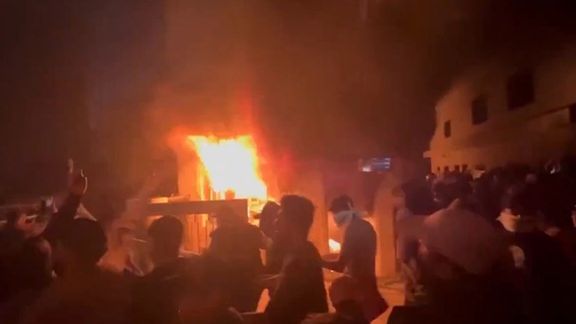
Alleged supporters of the Iran-backed Hashd al-Shaabi militia Sunday stormed the headquarters of the Kurdistan Democratic Party (KDP) in the Iraqi capital and set it on fire.
The rioters behind the Sunday night attack in Bagdad were angry over a tweet deemed as insulting to Ayatollah Ali Sistani, the most influential Shia cleric in Iraq.
According to Iran’s official IRNA news agency, the protesters called the KDP offices a "center of sedition" and demanded their closure. Some of them were holding photos of Sistani.
The KDP, the ruling party in the semi-autonomous Kurdistan Region of northern Iraq, condemned the tweet posted on the official account of Nayif Kurdistani, a man allegedly affiliated to it, and said that the party respects all religious groups and "honorable clerics."
Following the uproar caused by the tweet, Kurdistani apologized and deleted the post, saying later his Twitter account had been hacked and that he is not responsible for its controversial content.
A source in the Kurdistan Region’s Interior Ministry told local media that Kurdistani was arrested over the tweet the authorities considered as "offensive" to the Iraqi Supreme Religious Authority.
This is not the first time that KDP offices are set on fire in Baghdad.
In October 2020, supporters of the Popular Mobilization Forces (PMF) – or Hashd al-Shaabi – set ablaze the party’s headquarters in Karrada district after a Kurdish former minister called for the expulsion of the Iran-backed paramilitary force from Baghdad’s Green Zone.
Tehran has been accused of directly interfering in Iraq’s internal affairs, including elections, for at least 20 years.